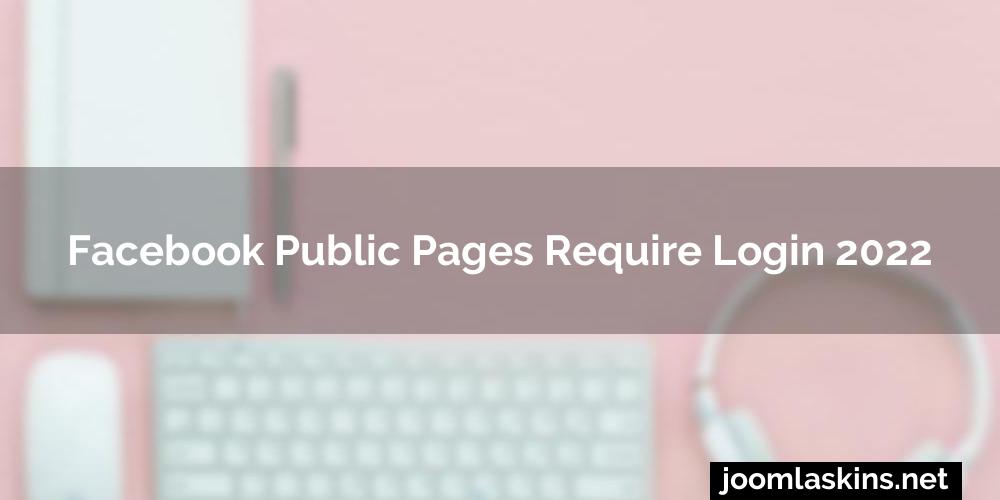Are you ready to say goodbye to your days of browsing Facebook public pages without a login? Starting in 2022 Facebook is requiring all users to have a login to access public pages.
Advantages of Requiring a Login
The new login requirement comes with some advantages. Facebook users will be able to access more personalized content and access to exclusive content. Additionally the login requirement will help Facebook combat malicious activities such as bots and fake accounts.
| Advantage | Benefit |
|---|---|
| Personalized Content | Users will have access to content tailored to their interests. |
| Exclusive Content | Users will be able to access exclusive content. |
| Combat Malicious Activity | Facebook will be able to better combat malicious activities such as bots and fake accounts. |

More here: Sonicwall Sma Arstechnica and Send Mailmessage Multiple Recipients.
Practical Considerations
It goes without saying that with the rising prevalence of privacy and data security concerns asking users to log in before accessing public pages on Facebook is a sensible measure. But there are practical considerations to take into account as well. For example many individuals businesses and organizations have become accustomed to leveraging the platform’s public pages for marketing and promotional purposes.
For these organizations requiring users to log in might limit the public’s ability to interact with their content since those without a Facebook account might be less likely to go through the sign-up process. Businesses must also consider how this may affect their search engine optimization as web crawlers won’t be able to index non-logged-in content.
Another thing to consider is the time element. An organization shouldn’t expect an immediate effects on visitor traffic when they switch to a login requirement. It takes time for users to become accustomed to this new process so organizations should allow a reasonable transition period to gain user trust.
Ultimately Facebook’s move will likely be a positive one for security and privacy reasons despite any possible drawbacks. It’s important however for businesses to take the necessary steps to ensure their pages remain user-friendly and reachable to their ever-expanding audience.
Disadvantages of Requiring a Login
Ah-hah looks like Facebook is shaking things up yet again! Starting in 2022 public pages on the platform will require users to login before they can view the content. Now that’s a move that’s sure to get the people up in arms not least because this means the potential demise of window-shopping on Facebook. With no longer being able to casually browse posts explore pages and view comments without logging in it’s certain that the whole user experience on the platform is bound to become a lot more cumbersome.
Of course there are also more serious implications. The much less tangible – but potentially more far-reaching – disadvantages of requiring a login are wide-ranging: from a privacy standpoint this will make it easier for Facebook to profile and track its users; from a marketing perspective this will severely limit the reach of public pages as people in the target demographic must have a Facebook account first; from a security standpoint this will place an additional barrier for users who may worry about exposing their personal information when logging into a public site; and from a general usability perspective this could turn people away from the platform if they feel too reluctant to avoid the hassle of signing in to view the content.
So unfortunately if Facebook’s new plan goes ahead there will be some unintended consequences. But perhaps this is a necessary step forward if the company wants to continue to build trust and credibility as Microsoft Google and many others continue to gun for their slice of the social media pie.
Alternatives to Changing the Rules
It’s true that some people might grumble and gnash their teeth at the thought of having to log into a Facebook page in order to comment or like a post but the truth is that nothing is set in stone. There are plenty of alternatives to the traditional page login rule so let’s take a look at some of them.
First up is the oft-overlooked ‘favored account’ method. With this option users can designate an existing Facebook profile as their preferred account for accessing the public page. It’s a quick and easy way to get around the login requirement and it allows users to be sure that their posts and comments are always coming from their chosen account.
Next we have the ‘disguised profile’ option. This is a slightly more technical approach but a lot of people find it useful. Basically users create a separate profile that has no connection to their original one and use it to access the public page. This preserves their original profile and allows for total anonymity when commenting or liking posts.
Finally we have the ‘anonymous access’ approach. As the name suggests this gives users the ability to access the page without their identity being tied to it. It’s similar to the ‘favored account’ method but it’s a bit more secure and doesn’t require the user to tie their real identity to the page.
No matter which approach you choose one thing is for sure: there’s no need to be resigned to the fate of having to log in to comment or like a post. There are plenty of alternatives that can make the Facebook public page experience easier and more enjoyable.
Resources